Team Members (A-L)
Team Members (A-L)
Yasutada Akiba, MD, PhD - Digestive Diseases

Project Scientist
David Geffen School of Medicine at UCLA
Research Scientist
Greater Los Angeles Veterans Affairs Healthcare System
Dr. Akiba received his MD in internal medicine and PhD in gastroenterology from Keio University in Tokyo, Japan. Since 1997, Dr. Akiba has studied duodenal mucosal defense mechanisms under VA Merit review and NIH grant for Dr. Jonathan Kaunitz. He has established in vivo microscopic system, by which epithelial intracellular pH, mucosal blood flow and mucus secretion can be simultaneously measured, and duodenal perfusion system, by which bicarbonate secretion and luminal mediators output can be measured. Using these techniques, he has reported how the duodenal mucosa enhances defense mechanisms in response to luminal acid. Recently, he has established a new concept, luminal chemosensing by which luminal compounds are detected by epithelial surface receptors, transporters and enzymes, then triggering epithelial responses to enhance mucosal defense mechanisms to protect mucosa of esophagus, stomach and duodenum. These luminal compounds include endogenous acid, CO2, and ATP, and luminal nutrients including amino acid L-glutamate, capsinoids, long- and short-fatty acids, and bile acids. Furthermore, Dr. Akiba has established a new therapeutic concept for NSAIDs-induced small intestinal ulcers using dipeptidyl peptidase IV inhibition and free fatty receptor agonists. Dr. Akiba and collaborators have published 12 original papers in peer-review journals including two in-press papers and six reviews in the leading journals of gastroenterology or physiology in recent five years. Currently, he is studying how lipopolysaccharide (LPS) transport, implicated in low-grade inflammation, followed by metabolic disorders, is regulated by intestinal epithelium and hormonal mediators.
Grace M. Aldrovandi, MD, CM - Pediatric Infectious Diseases
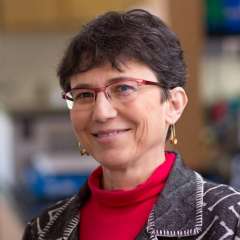
Professor and Chief
Department of Pediatrics
Division of Pediatric Infectious Diseases
UCLA Mattel Children’s Hospital
David Geffen School of Medicine at UCLA
Dr. Aldrovandi received her undergraduate and her medical degree from McGill University in Montreal, Canada. She completed an internship and residency at McGill, as well as a research fellowship in pediatric infectious diseases at the University of California, Los Angeles. She is a board-certified pediatric infectious diseases specialist with over 20 years experience in caring for both general pediatric infectious diseases as well as HIV infected children and their families. Dr. Aldrovandi’s research interests include pediatric HIV, the effects of breast milk on child health and infections in immunocompromised children. She has published more than 200 peer review publications in such journals as Nature, Journal of Virology, and the New England Journal of Medicine and multiple book chapters. She has been a member of many National Institutes of Health study sections and lectured throughout the world.
Dr. Aldrovandi has had continuous NIH funding for over 20 years, and in recognition of her significant contributions was honored with the prestigious Elizabeth Glaser Scientist Award. She and her collaborators were the first to describe increased morbidity and mortality among HIV-exposed uninfected infants, an essential discovery with potential implications for improving health outcomes in this vulnerable population. Dr. Aldrovandi's laboratory is at the forefront of investigating microbial communities' role in various compartments, ranging from mucosal (breast, vagina, rectum, oral) to non-mucosal (skin) regions. Their pioneering work demonstrated the presence of perturbations in the microbiome of infants born to HIV-infected women, despite the infants not being infected with HIV. Employing sophisticated bioinformatics approaches, they have skillfully modeled microbial maturation and strain transfer from breast milk to infant stool, unveiling new insights into this crucial area of research.
Having played prominent leadership roles in several NIH-funded clinical trials Networks, Dr. Aldrovandi has a deep understanding of the collaborative efforts essential for transformative research in the field. This unique perspective allows her to identify opportunities for innovative and impactful investigations.
Dr. Aldrovandi is deeply committed to nurturing the next generation of scientists and has actively engaged in mentoring activities to encourage underrepresented Latino and African-American high school students to pursue careers in STEM fields. Her mentoring efforts have garnered attention and recognition, with a feature on Despierta America, highlighting the impact of their work in inspiring and guiding young minds towards scientific excellence. Moreover, Dr. Aldrovandi has had the privilege of mentoring numerous talented individuals, guiding them through their academic and research journeys. Her mentorship has been instrumental in helping these individuals secure prestigious awards and grants, including T32, K08, K23, K99, R01, and a Doris Duke Award. ACTG IMPAACT Laboratory Center
Daniel T. Blumstein, PhD - Ecology & Evolutionary Biology

Professor, Department of Ecology & Evolutionary Biology; UCLA Institute of the Environment & Sustainability
Co-Director, UCLA Evolutionary Medicine Program
UCLA College of Life Sciences
President, Board of Trustees, Rocky Mountain Biological Laboratory
Dr. Blumstein received his undergraduate degrees in environmental, population, and organismic biology (magna cum laude), and in environmental conservation (cum laude) at The University of Colorado, Boulder. He received his MS and PhD in animal behavior at the University of California Davis, and was a DAAD post-doctoral fellow at the University of Marburg (Germany), an NIH-NRSA at the University of Kansas, and an Australian Postdoctoral Fellow at Macquarie University (Australia). He has studied animal behavior and conservation biology in Australia, Canada, the Caribbean, French Polynesia, Germany, Kenya, New Zealand, Pakistan, Russia, and the United States. He was a Fulbright Fellow (to Pakistan) and is an elected Fellow of the Society of Biology and the Animal Behavior Society. He is the recipient of numerous awards including the UCLA Faculty Gold Shield Award for extraordinary accomplishment in undergraduate teaching and research, and the Animal Behavior Society’s Quest Award for seminal contributions to the study of behavior. He is the author of eight books and over 500 scholarly publications. He was an editor of the journal Animal Behaviour, and is currently an associate editor of the Quarterly Review of Biology, and is (or was) on the editorial boards of Behavioral Ecology, Biology Letters, Evolution, Medicine, and Public Health, and Ethology. He is the founding editor in chief of Frontiers in Conservation Science. A major thrust of his research works to integrate different fields and apply ecological, evolutionary, and behavioral principles to applied questions. He spends his summers studying marmot behavior and ecology at the Rocky Mountain Biological Laboratory, Gothic, Colorado. Between 2009 and 2016 he was the chair of the Department of Ecology and Evolutionary Biology at UCLA. Blumstein Lab
Tejas Bouklas, PhD - Microbiology, Immunology & Molecular Genetics
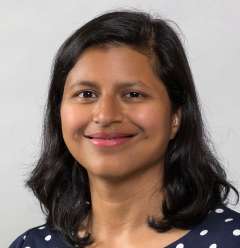
Assistant Professor of Teaching
Department of Microbiology, Immunology and Molecular Genetics
UCLA College of Life Sciences
Dr. Bouklas earned her PhD in biomedical sciences from Albert Einstein College of Medicine, completed a postdoctoral fellowship with the Department of Medicine (Division of Infectious Disease) at Stony Brook University, and is a broadly trained microbiologist focusing on host-pathogen interactions. She provides experiential learning and mentoring opportunities to her students, who conduct research in her classroom on phage therapy (HHMI SEA-PHAGES), antimicrobial discovery (Tiny Earth Initiative, CaleDNA), and most recently their gut/oral microbiome (Goodman-Luskin Microbiome Center). Dr. Bouklas is the recipient of several grants to support her research with students, who have themselves received awards, presented at national conferences, and co-authored papers. She is an American Society of Microbiology Undergraduate Faculty Research Initiative Fellow, and is committed to advancing microbial research, and training of the next generation of scientists. Bouklas Lab
Siobhan A. Braybrook, PhD - Molecular, Cell & Developmental Biology
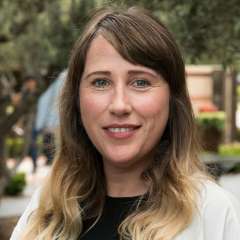
Associate Professor
Molecular, Cell and Developmental Biology
UCLA College of Life Sciences
Dr. Braybrook received her BSc Honors in plant biology from the University of Guelph, Canada, in 2003. During undergrad she worked with Annette Nassuth on cold-tolerance in grapes and with Derek Bewley on seed germination mechanics in tomatoes. She then moved to UC Davis, with conditional acceptance, to work with John Harada on somatic embryo development. Her plant mechanics work began during her NSF-funded postdoc in the lab of Cris Kuhlemeier (Bern, CH) where she collaborated with Alexis Peaucelle (INRA, France) to develop AFM-based methods measuring cell wall mechanics in apical meristems. In 2013, Dr. Braybrook started The Plant Mechanics Group at The Sainsbury Laboratory, University of Cambridge. In 2017 the lab moved to UCLA to the Department of Molecular, Cell and Developmental Biology. She is a member of the California Nanosystems Institute, the Molecular Biology Institute, the Center for the Study of Women, and the DOE Institute of Genomics and Proteomics. She also serves on the Life Sciences Diversity Advisory Committee and the MBI’s Diversity & Inclusion Committee, and is a contributor to Plantae’s Changing Climates & Culture resource. Morphomech Lab @ UCLA
Bridget L. Callaghan, PhD - Psychology

Assistant Professor, Department of Psychology
Division of Life Sciences, UCLA College of Letters and Sciences
Dr. Callaghan leads a laboratory studying interactions between mental and physical health across development, and the impact that early caregiving relationships (particularly adverse caregiving) have on those interactions. Dr. Callaghan's lab is investigating the gastrointestinal and oral microbiome as pathways via which stressful early experiences may get 'under the skin' to influence physical and mental health. They are also examining the microbiome as a mediator of intergenerational and transgenerational effects of adversity on youth health outcomes. Dr. Callaghan's research has been generously funded through the National Institutes of Mental Health, Brain Behavior Research Foundation, and National Health and Medical Research Council. She has received several honors including the Federation of the Association of Behavioral and Brain Sciences Early Career Impact Award, and the International Society for Developmental Psychobiology Kucharski Young Investigator Award, and was named as a 'rising star' by the Association for Psychological Science. She received her BA and PhD in psychology and her masters in clinical psychology from the University of New South Wales in Australia. She has worked clinically in the field of developmental psychology, and completed her postdoctoral training at Columbia University. Dr. Callaghan is also a faculty-in-residence at UCLA where she lives in the Residential Halls with UCLA undergraduates, building community through programming and mentorship. Brain and Body Lab
Emily L. Cardarelli, PhD - Earth, Planetary, and Space Sciences

Assistant Researcher
RIMFAX Instrument Team | Mars 2020 Science Team
Department of Earth, Planetary, and Space Sciences
University of California, Los Angeles
Dr. Cardarelli is a microbial ecologist and planetary scientist who seeks to detect signs of life and habitability on Mars and beyond. She uses her interdisciplinary background in molecular biology, geology, and earth system science to explore subsurface environments and life below ground on Earth. Using laboratory-, field-, and mission-based studies, Dr. Cardarelli employs genomic, geochemical, and geophysical techniques for life detection in the environment.
Dr. Cardarelli received her BS in earth and environmental sciences (magna cum laude) at Tulane University. Dr. Cardarelli earned her MS in 2015 and PhD in 2021 from Stanford University in geomicrobiology, where her doctoral work focused on the dynamics of microbial communities at land-water interfaces in floodplain ecosystems of the American West. Her research examined how these communities are structured by biogeography and depth, and respond to environmental fluctuations, such as drought-to-flood cycles. Dr. Cardarelli was also a JPL postdoctoral research fellow in the Astrobiology and Ocean Worlds Group from 2020-2023 and core member of the Mars 2020 Science Team and SHERLOC Instrument Team. She investigated magnesite deposits from Kunwarara, QLD, Australia as an analog for Mg-carbonate deposits within Jezero crater, Mars.
At UCLA, Dr. Cardarelli is on the Mars 2020 Science Team and is collaborator on the Mars 2020 RIMFAX, Mastcam-Z, and SHERLOC Instrument Teams. She leads decision-making and target selection for remote and proximity science analysis on Mars 2020 for over 60 sols of Mars 2020 science and instrument operations as a tactical science lead. Her research investigates the structure and preservation potential of magnesium carbonate deposits in Jezero crater, Mars and microbial communities in Death Valley, CA, in pursuit of identifying signs of exobiology and habitability. Cardarelli Lab
Lin Chang, MD - Digestive Diseases

Vice Chief, Vatche and Tamar Manoukian Division of Digestive Diseases
Program Director, UCLA GI Fellowship Program
Director, Walter and Shirley Wang Center for Integrative Digestive Health
Co-Director, G. Oppenheimer Center for Neurobiology of Stress and Resilience
Director, Clinical Studies and Database Core, Goodman-Luskin Microbiome Center
Professor of Medicine
David Geffen School of Medicine at UCLA
Dr. Chang earned her medical degree from the UCLA School of Medicine and completed her internship and residency in internal medicine at Harbor-UCLA Medical Center. She completed her gastroenterology fellowship training at the UCLA affiliated training program in gastroenterology. Dr. Chang’s clinical expertise is in disorders of gut-brain interactions which include irritable bowel syndrome (IBS), chronic constipation and functional dyspepsia. Her research is focused on the pathophysiology of IBS related to stress, sex differences, genetic and epigenetic factors, neuroendocrine alterations, and gut microbiome and the treatment of IBS. She is the vice chief of the Vatche and Tamar Manoukian Division of Digestive Diseases at UCLA, director of the Walter and Shirley Wang Center for Integrative Digestive Health, co-director of the G. Oppenheimer Center for Neurobiology of Stress and Resilience, director of the Clinical Studies and Database Core of the Goodman-Luskin Microbiome Center, and program director of the UCLA Gastroenterology Fellowship Program. Dr. Chang is a recipient of the Janssen Award in Gastroenterology for Basic or Clinical Research, AGA Distinguished Clinician Award, and AGA Distinguished Educator Award. She has authored more than 185 original research articles, 75 review articles and 30 book chapters on her specialty interests and is a frequent speaker at national and international meetings. Active in professional organizations, she is a member of the Rome Foundation Board of Directors and previously served as clinical research councilor of the American Gastroenterological Association (AGA) Governing Board and president of the American Neurogastroenterology and Motility Society (ANMS). She also serves as associate editor of the journal, Gastroenterology. She is a fellow of the AGA and American College of Gastroenterology (ACG). Chang Lab
Vivian Y. Chang, MD - Pediatric Hematology Oncology
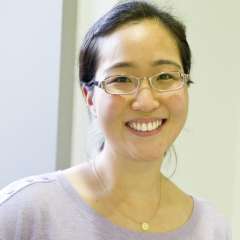
Associate Clinical Professor of Pediatrics
Division of Pediatric Hematology Oncology
David Geffen School of Medicine at UCLA
Dr. Chang is a pediatric hematologist-oncologist and co-director of the Pediatric Cancer Predisposition program at UCLA. Her clinical expertise is taking care of families who have or are suspected to have underlying genetic conditions that increase risk of cancer. Her broad research interests are in precision health and using genetics and genomics to advance understanding of cancer susceptibility. Her lab is currently studying hematopoietic stem cell regeneration and leukemogenesis in Bloom Syndrome, a DNA repair disorder, that is characterized by short stature, mild immune deficiency, and early-onset cancer. We have found microbiome differences in a mouse model of Bloom Syndrome compared to wildtype mice and are investigating how this may be affecting hematopoietic stem cell self-renewal and regeneration. The Chang Lab
Irene A. Chen, MD, PhD - Chemical & Biomolecular Engineering; Chemistry & Biochemistry

Professor
Department of Chemical and Biomolecular Engineering
Department of Chemistry and Biochemistry
Henry Samueli School of Engineering and Applied Sciences at UCLA
Dr. Chen received a BA in chemistry and an MD-PhD in biophysics from Harvard and was a Bauer Fellow in systems biology at Harvard. She has received the Searle Scholar award, NIH New Innovator award, the Camille Dreyfus Teacher-Scholar award, and the David White award for outstanding contribution in astrobiology. She has been a Simons Investigator for the Collaboration on the Origin of Life since 2013. Her laboratory studies life-like biochemical systems to understand their fundamental properties and address emerging challenges in biotechnology and infectious disease. Their focus is biomolecular design and evolution in two nanoscale systems: simple synthetic cells and bacteriophages (phages). The Chen Laboratory
Arpana Church, PhD - Digestive Diseases

Co-Director, Goodman-Luskin Microbiome Center
Director, Neuroimaging Core, G. Oppenheimer Center for Neurobiology of Stress and Resilience
Ingestive Behavior and Obesity Program
Associate Professor
Vatche and Tamar Manoukian Division of Digestive Diseases
David Geffen School of Medicine at UCLA
Dr. Church completed a PhD degree in psychology, followed by an APA accredited clinical internship at Massachusetts General Hospital/Harvard Medical Center. Her programmatic line of research focuses on the interactions between environmental and biological factors in shaping neurobiological phenotypes associated with stress-based diseases such as obesity. Broadly defined, her research aims to integrate two systems (the brain and the gut) in order to better understand the underlying mechanisms associated with obesity and altered ingestive behaviors. The application of a “systems biology” approach to her research allows her to test the interactions between multiple factors, both inside and outside the body (e.g., sex, race, brain, microbiome, inflammation, environment), in order to better understand the complex pathophysiology of obesity. This is relevant to obesity, as it is a risk factor for many chronic diseases, and disproportionately affects ethnic minorities and women. These alarming projections have led to NIH and Healthy People 2020 priority initiatives directed at reducing ethnic and sex disparities. Her goal is to develop a comprehensive model that provides a powerful and sensitive biomarker that will increase biological readouts of obesity and altered ingestive behaviors, thus bringing to the forefront those individuals who are at increased risk as a result of disadvantaged backgrounds.
In order to pursue this line of research she recently received a R01 grant from NIMHD (NIH) on the “Social Isolation and Discrimination as Stressors Influencing Brain-Gut Microbiome Alterations among Filipino and Mexican American.” She has also received several industry funded grants as PI and till date she has published over 70 peer-reviewed articles. These grants have allowed her to focus on the following main themes of research: 1) Investigate how novel pathways related to the brain-gut-microbiome (BGM) system may explain modulation of signals from the gut-microbiome on the brain via systemic immune activation; 2) Explain how risk factors associated with socio-cultural and environmental stressors “get under the skin” and are embedded in biology; 3) Identify subgroup differences (e.g., race and sex) related to obesity; 4) Model longitudinal patterns and changes across the lifespan as they relate to obesity in order to help predict risk factors leading up to the development of obesity while being able to identify prognostic markers and 5) Determine changes associated with various interventions (e.g., brain-targeted such as cognitive behavioral therapy, or gut-based such as specific diets) directed at altered ingestive behaviors and obesity. Church Lab
Christopher S. Colwell, PhD - Psychiatry & Behavorial Sciences

Professor, Department of Psychiatry and Biobehavioral Sciences
David Geffen School of Medicine at UCLA
Dr. Colwell is a neuroscientist who has served on the UCLA School of Medicine faculty since he joined the Department of Psychiatry and Biobehavioral Sciences in 1997. He became an associate professor in 2002, and has been a professor since 2008. Dr. Colwell earned his BS in neuroscience from Vanderbilt University in 1985. During this time, he started his research in circadian rhythms under the mentorship of Dr. T. Page. Dr. Colwell earned his PhD in biology at the University of Virginia in 1991. His thesis work explored the neural mechanisms by which light regulates circadian rhythms. Dr. Colwell continued this line of research during a postdoctoral fellowship at the University of Virginia with Dr. G. Block. A second postdoctoral fellowship was carried out on the topics of motor control and excitotoxicity in the laboratory of Dr. M. Levine at UCLA. Dr. Colwell learned how to utilize imaging techniques to measure calcium levels inside neurons while a visiting scientist in the laboratory of Dr. Konnerth at the University of Saarland, Germany. Since Dr. Colwell's faculty appointment at UCLA, his laboratory's research has focused on understanding the mechanisms underlying circadian rhythms in mammals. Dysfunction in the timing these daily cycles is a key symptom in a number of neurological and psychiatric disorders. Better understanding the basic biology of this timing system should result in new therapies to improve the quality of life of these patients and the people who care for them. Dr. Colwell Profile
Jie Deng, MD, PhD - Radiation Oncology

Assistant Professor in Residence
Department of Radiation Oncology
David Geffen School of Medicine at UCLA
Dr. Deng is a physician-scientist who specializes in the study of tumor immunology in the context of cancer progression, radiation therapy and immunotherapy. One key component in optimizing cancer therapies for patients includes improving treatment-related toxicity profiles to maximize the therapeutic index of cancer therapy. One active area of her research focus includes studying the oral and gut microbiome in patients undergoing cancer therapy to better understand how the microbiome and immune system shape the response to cancer therapy and its associated side effects.
Gregory P. Donaldson, PhD - Microbiology, Immunology & Molecular Genetics

Director, Goodman-Luskin Microbiome Center Human Probiotic Core
Assistant Professor
Department of Microbiology, Immunology, & Molecular Genetics
Vatche & Tamar Manoukian Division of Digestive Diseases
California NanoSystems Institute
David Geffen School of Medicine at UCLA
Dr. Donaldson received a BS in microbiology from the University of Maryland, College Park and a PhD in microbiology from Caltech. He moved to the Rockefeller University as a Damon Runyon Cancer Research Foundation Postdoctoral Fellow working with Dr. Daniel Mucida in the Laboratory of Mucosal Immunology. Dr. Donaldson’s work has identified new mechanisms that sustain the spatial and temporal stability of the microbiome and the homeostatic response of the host to these microbes. In particular, his work so far has identified new functions of immunoglobulin A, the most abundant antibody isotype made in humans, in mediating the symbiotic relationship between the microbiota and epithelial cells that line the intestines. Intestinal epithelial cells balance nutrient absorption with barrier function, but they also co-evolved in the presence of gut microbiota. While bacterial proximity has historically been assumed to be undesirable, epithelial cells tolerate colonization by commensal microbes, through mechanisms that are poorly understood. The Donaldson Lab studies how epithelial cells and microbiota sense and respond to each other, how this shapes the composition of our microbiome, and how these molecular conversations impact the health of our gut. Donaldson Lab
Jennifer A. Fulcher, MD, PhD - Infectious Diseases

Assistant Professor, Division of Infectious Diseases, Department of Medicine
David Geffen School of Medicine at UCLA
Infectious Diseases Section, VA Greater Los Angeles Healthcare System
Dr. Fulcher completed her MD-PhD degrees through the Medical Scientist Training Program (MSTP) at UCLA, then completed additional postdoctoral research training in mucosal immunology. Clinically, she is a practicing infectious diseases physician, including providing longitudinal HIV primary care at the West Los Angeles Veterans Affairs Medical Center. Her research interests include a focus on the effects of HIV and substance use on the gut and oral microbiome. Her group has recently showed that certain drug use, specifically methamphetamines, can exacerbate inflammatory microbiome changes in persons living with HIV. She has also published studies showing that methamphetamine use induces inflammatory cytokine production in the rectal mucosa, which may alter susceptibility to HIV. Current projects include understanding the mechanisms of methamphetamine-associated dysbiosis in both the oral cavity and gut, and delineating the mucosal immune consequences of this. In addition to NIH K08 funding, she has received a Doris Duke Clinical Scientist Development Award and California HIV Research Program award to support her work.
Nandita Garud, PhD - Ecology & Evolutionary Biology

Assistant Professor
Department of Ecology and Evolutionary Biology
UCLA College of Life Sciences
Dr. Garud's research focuses on quantifying evolutionary dynamics in natural populations, with an emphasis on the human gut microbiome. Recently, she and her colleagues found that evolution can proceed in healthy human guts and that the broader ecological diversity can impact population genetic processes occurring within a species. Dr. Garud’s interdisciplinary training includes population genetics, statistics, and analysis of population genomic data, including metagenomic data. Her lab synthesizes these fields to develop and apply new computational methods to make population genetic inferences about the mechanisms of evolution, within and across host microbiomes. Dr. Garud received her BS in biology and biometry & statistics from Cornell University in 2008, MS in statistics from Stanford University in 2012, and PhD in genetics from Stanford University in 2015. She completed her postdoctoral training at the Gladstone Institutes at UC San Francisco and started her assistant professorship at UCLA in 2019. Dr. Garud is a Paul Allen Distinguished Investigator and a recipient of an NSF CAREER and UC Hellman fellowship. Garud Lab
Erica Grodin, PhD - Psychiatry & Biobehavioral Sciences

Adjunct Assistant Professor
Department of Psychiatry and Biobehavioral Sciences
David Geffen School of Medicine at UCLA
Dr. Grodin is a member of the Cousins Center on Psychoneuroimmunology and the Brain Research Institute. She is a clinical translational neuroscientist with a PhD in neuroscience and specialized graduate training in the neurobiology of alcohol use disorder (AUD). Dr. Grodin has several lines of research which seek to better understand the causes and correlates of AUD to ultimately identify promising interventions. One area of research seeks to characterize the gut microbiome brain axis in alcohol use disorder, with the goal of creating personalized psychobiotic treatments. Dr. Grodin’s research has been generously funded through the National Institute on Alcohol Abuse and Alcoholism and the UCLA Friends of Semel Research Scholars Program. She has received several honors including being selected for the NIDA-NIAAA Frontiers in Addiction Research Early Career Investigator Showcase, the Research Society on Alcoholism Junior Investigator Merit Award, and has received travel awards from the American College on Neuropsychopharmacology, American Psychological Association, Winter Conference on Brain Research, and the Society for Biological Psychiatry. Dr. Grodin received her BA in psychology from American University and her PhD in neuroscience from Brown University.
Yvonne L. Hernandez-Kapila, DDS, PhD - Dentistry; Digestive Diseases
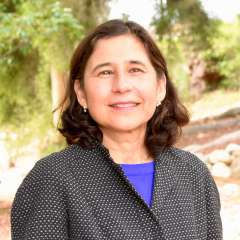
Diplomate ABP; ELAM Fellow
Felix and Mildred Yip Endowed Chair in Dentistry
Professor and Associate Dean for Research
Biosystems and Function, Periodontics
UCLA School of Dentistry
Vatche & Tamar Manoukian Division of Digestive Diseases
David Geffen School of Medicine at UCLA
Dr. Hernandez-Kapila received her BA from Stanford University, and her DDS, periodontology residency training, PhD in oral biology, and postdoctoral fellowship from University of California, San Francisco (UCSF). The Hernandez-Kapila Lab focuses on basic, translational, and clinical studies focused on oral and systemic disease connections with a focus on the oral-gut-brain axis, host-microbe/ECM interactions, and the oral microbiome/virome.
Dr. Hernandez-Kapila is the Felix and Mildred Yip Endowed Chair in Dentistry and a professor and associate dean for research at UCLA School of Dentistry. Previously, she served as the founding director of Global Initiatives at the University of Michigan School of Dentistry, where she worked with large subject cohorts in a global setting. She then served as chair of Periodontology and the Earl Robinson Endowed Distinguished Professor at UCSF School of Dentistry. As a clinician–scientist with >30 years of clinical, research, teaching/mentoring, and administrative experience, Dr. Hernandez-Kapila has made several important discoveries relating to the microbiome/virome of the oral cavity and its importance in the oral–gut–brain axis; linking oral and systemic diseases. Her work has also identified host–microbe interactions and cellular and molecular mechanisms governing oral cancer carcinogenesis and the pathogenesis of periodontal disease. Dr. Hernandez-Kapila is a highly experienced investigator and administrator who has been continuously funded by NIH for more than 30 years and published more than 170 peer-reviewed publications in high-impact journals. She has long-term service as a council member and grant reviewer for the NIH/NCI/NIDCR, served on editorial boards for high-impact journals/textbooks, and received national mentoring awards. In recognition of her seminal contributions to science and mentoring, Dr. Hernandez-Kapila received the American Academy of Periodontology (AAP) Distinguished Scientist Award in 2019, the Annual Research Lecture for the UCSF School of Dentistry Research and Clinical Excellence Day in 2019, the American Association for Dental Research (AADR) Irwin D. Mandel Distinguished Mentoring Award in 2019, the UCSF Alumni Discovery Award in 2021, the UCSF Alumni Medal of Honor in 2022, the American Academy of Periodontology Clinical Research Award in 2024, the American Dental Association Norton M. Ross Award for Excellence in Clinical Research, inducted as an American Association for the Advancement of Science (AAAS) Fellow in 2024, and the William J. Gies Periodontology Award in 2025. Further, given, Dr. Hernandez-Kapila’s background as a first-generation college student from a historically marginalized community (Mexican/farm worker and low SES background), she understands diversity, equity, and inclusion issues at their core, and has served on multiple taskforces and programs to enhance diversity in science at all levels, including education/training and subject recruitment. Hernandez-Kapila Lab
Andrea L. Hevener, PhD - Endocrinology, Diabetes & Hypertension

Professor of Medicine
Sidney Roberts and Clara Szego Roberts Chair in Molecular Endocrinology
Division of Endocrinology, Diabetes and Hypertension
David Geffen School of Medicine at UCLA
Iris Cantor-UCLA Women’s Health Center
Dr. Hevener’s laboratory studies the transcriptional regulation of metabolism and insulin action with a specific focus on the biological actions of hormone responsive nuclear receptors in metabolic tissues. Dr. Hevener is the associate director for research of the Iris Cantor-UCLA Women’s Health Center and the director of the NIH-sponsored UCSD-UCLA Diabetes Research Center Metabolic and Molecular Physiology Core. Dr. Hevener’s laboratory is supported UCLA Department of Medicine, the STOP CANCER Foundation I.C.O.N. Award, the Helmsley Charitable Trust, the UCLA CTSI, and the Iris Cantor Women’s Health Executive Advisory Board. In addition to ongoing National Institutes of Health R01 funding, Dr. Hevener is currently the principal investigator of Project 3 of an NIH U54 Specialized Center of Research Excellence (SCORE) studying sex differences and women’s health related to metabolism and the lead investigator of an NIH Director’s Common Fund award to study the molecular transducers of physical activity as part of the MoTrPAC consortium. The overarching goal of the Hevener laboratory is to identify therapeutic opportunities to improve the metabolic health of women and reduce chronic disease risk and burden.
Kent L. Hill, PhD - Microbiology, Immunology & Molecular Genetics
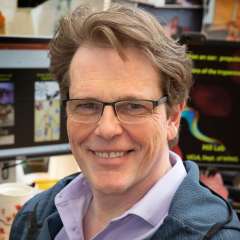
Professor, Department of Microbiology, Immunology & Molecular Genetics
David Geffen School of Medicine at UCLA
Elected Fellow, American Academy of Microbiology
Dr. Hill studies cell biology, pathogenesis, and transmission of African trypanosomes, parasitic protozoa that afflict humans and other mammals. He is particularly focused on cilium biology and trypanosome motility and signaling mechanisms that contribute to parasite viability, cell-cell communication, pathogenesis, and transmission through the parasite’s insect vector. He has published numerous articles on these topics in influential journals, including Nature, PNAS, Journal of Cell Biology, Nature Genetics, Nature Communications, PLoS Pathogens, eLife, Eukaryotic Cell, Cellular Microbiology, Trends in Microbiology, Annual Review of Microbiology, Nature Reviews Microbiology, and Cell Discovery. His group employs a multidisciplinary approach, combining cell biology, biochemistry, genetics, molecular genetics, structural biology (CryoEM), bioinformatics, proteomics, systems biology, tsetse fly transmission, and rodent infection models to understand parasite biology and host-pathogen interactions. Dr. Hill is internationally recognized as a world leader in the study of trypanosome motility, signaling, and cilium biology broadly. His group has pioneered efforts to understand flagellum structure and function in trypanosomes and established that beyond its role in motility, the flagellum provides a signaling platform crucial for parasite transmission and pathogenesis. Dr. Hill’s group discovered social motility in trypanosomes, which has stimulated renewed interest and progress in understanding trypanosome signal transduction systems used for transmission and infection. Dr. Hill received his BS in chemistry and biology from Northern Illinois University and his PhD from UCLA. Dr. Hill Profile
Tiffany C. Ho, PhD - Behavioral Neuroscience; Psychology

Associate Professor
Jeffrey and Wenzel Endowded Term Chair in Behavioral Neuroscience
Department of Psychology and Biobehavioral Sciences
UCLA College and Life Sciences
Dr. Tiffany Ho is an associate professor and the Jeffrey and Wenzel Endowed Term Chair in Behavioral Neuroscience in the Department of Psychology. She holds a joint appointment in the Department of Psychiatry and Biobehavioral Sciences, and is a participating faculty member in the Brain Research Institute and Interdepartmental Graduate Program in Neuroscience (NSIDP) at UCLA. Dr. Ho studied Cognitive Science as an undergraduate at UC Berkeley before earning her PhD in psychology at UC San Diego. Dr. Ho returned to the Bay Area to receive postdoctoral training in clinical neuroscience at UC San Francisco in the Department of Psychiatry and in affective science at Stanford University in the Department of Psychology. From 2018-2019, Dr. Ho was an Instructor at Stanford University in the Department of Psychiatry and Behavioral Sciences. From 2019-2022, Dr. Ho was an assistant professor in the Department of Psychiatry and Behavioral Sciences at UC San Francisco. Cognition, Affect, and Neurodevelopment in Youth Lab (CANDY Lab)
Elaine Y. Hsiao, PhD - Integrative Biology & Physiology

Director, Goodman-Luskin Microbiome Center
De Logi Associate Professor of Biological Sciences
Department of Integrative Biology & Physiology
Division of Life Sciences, UCLA College of Letters & Sciences
Vatche and Tamar Manoukian Division of Digestive Diseases, Department of Medicine
Department of Microbiology, Immunology, Molecular Genetics
David Geffen School of Medicine at UCLA
Dr. Hsiao leads a laboratory studying fundamental interactions between the microbiome, brain, and behavior, and their applications to neurological disorders. Inspired by the interplay between the microbiota and nervous system, the Hsiao laboratory is mining the human microbiota for microbial modulators of host neuroactive molecules, investigating the impact of microbiota-immune system interactions on neurodevelopment, and examining the microbiome as an interface between gene-environment interactions in neurological diseases. Research from the Hsiao Lab has provided foundational evidence for microbiota-based interventions to treat gastrointestinal and behavioral symptoms of autism, regulate intestinal motility by controlling serotonin biosynthesis, promote the anti-seizure effects of the ketogenic diet, and alleviate hyperlipidemia in metabolic disease. Their work in these areas form the bases of programs in four biotechnology companies and have led to several honors, including the Blavatnik National Award in Life Sciences, Takeda Pharmaceuticals and New York Academy of Sciences Innovators in Science Award, Chan Zuckerberg Initiative Ben Barres Career Award, Packard Fellowship in Science and Engineering, Alfred P. Sloan Fellowship in Neuroscience, Klingenstein-Simons Fellowship in Neuroscience, Kavli Fellowship of the National Academy of Sciences, National Institutes of Health Director’s Early Independence Award, Forbes’ 30 Under 30 in Science and Healthcare, and National Geographic’s Emerging Explorer Award. Dr. Hsiao received her PhD in neurobiology from Caltech, and her BS in microbiology, immunology, and molecular genetics from UCLA. The Hsiao Lab at UCLA
Yu Huang, PhD - Materials Science & Engineering

Traugott and Dorothea Frederking Endowed Chair in Engineering
Professor & Chair, Department of Materials Science and Engineering
University of California, Los Angeles
Dr. Huang received her BS in chemistry from University of Science and Technology of China (USTC), and her PhD in physical chemistry and MA in chemistry from Harvard University. Before Dr. Huang embarked on her independent career at UCLA, she was awarded the prestigious Lawrence Fellowship and held a joint postdoctoral position with Lawrence Livermore National Lab (LLNL) and Massachusetts Institute of Technology (MIT). Her research focuses on mechanistic understanding of nanoscale phenomena and on exploiting the unique properties of nanoscale materials for various applications. Professor Huang’s achievements have gained her international and national recognition, including the Materials Research Society (MRS) Fellow, the Fellow of Royal Society of Chemistry (FRSC), Eni Award in Energy Transition, International Society of Electrochemistry (ISE) Prize for Experimental Electrochemistry, the International Precious Metal Institute (IPMI) Carol Tyler Award, the Presidential Early Career Award in Science and Engineering (PECASE), the National Institute of Health (NIH) Director’s New Innovator Award, the Defense Advanced Research Projects Agency (DARPA) Young Faculty Award, the World’s Top 100 Young Innovators award, the Sloan Fellowship, the International Union of Pure and Applied Chemistry (IUPAC) Young Chemist Award, and the Nano 50 Award. She is also recognized as the Highly Cited Researcher in material science by Web of Science. Huang Research Group
Jonathan P. Jacobs, MD, PhD - Digestive Diseases
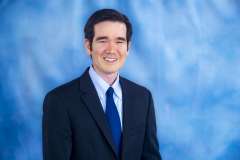
Co-Director, Goodman-Luskin Microbiome Center
Assistant Professor-in-Residence
Vatche and Tamar Manoukian Division of Digestive Diseases
David Geffen School of Medicine at UCLA
Dr. Jacobs graduated magna cum laude with highest honors from Harvard University with an AB in biochemistry. He subsequently received his MD from Harvard Medical School, graduating magna cum laude in a special field. During college and medical school, he trained in the laboratory of Diane Mathis and Christophe Benoist where he investigated the immunologic mechanisms of an autoantibody-mediated model of arthritis. This research was supported by a fellowship from the Howard Hughes Medical Institute. He completed a residency in internal medicine at Stanford University then joined UCLA as a gastroenterology fellow in 2010. He pursued additional scientific training at UCLA through the Specialty Training and Advanced Research (STAR) program under the mentorship of Jonathan Braun. He was awarded a PhD in cellular and molecular pathology in 2015 for his research on the intestinal microbiome and afterwards joined the UCLA Division of Digestive Diseases faculty. He established the UCLA Microbiome Core in 2016 - which provides a comprehensive suite of microbiome-related services to support microbiome research by the UCLA scientific community - and is now co-director of the Goodman-Luskin Microbiome Center.
Dr. Jacobs’ research explores the role of intestinal microbes in the development of inflammatory bowel disease (IBD), obesity, and other disorders. This involves a translational approach that includes detailed characterization of patients’ microbiome by sequencing and metabolomics as well as modeling of the effect of disease-associated human microbial communities in humanized gnotobiotic mice (i.e. germ-free mice colonized with human microbiota). He has published over 100 original research articles and reviews in scientific journals including Gut, Gastroenterology, Microbiome, Cell Host & Microbe, Gut Microbes, Genome Medicine, Cellular and Molecular Gastroenterology and Hepatology, Scientific Reports, and Proceedings of the National Academy of Science. His ongoing projects employ animal models and multi’omics analysis of patient cohorts to define the role of IBD-associated genes in shaping the intestinal microbiome and to identify microbes and microbial products that promote IBD and obesity. Jacobs Lab
Swapna Joshi, PhD - Digestive Diseases
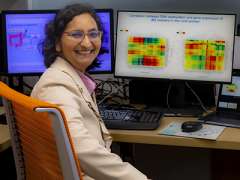
Co-Director, Integrative Biostatistics and Bioinformatics Core, Goodman-Luskin Microbiome Center
Adjunct Assistant Professor
Vatche and Tamar Manoukian Division of Digestive Diseases
David Geffen School of Medicine at UCLA
Dr. Joshi co-leads the Integrative Biostatistics and Bioinformatics Core at the Goodman-Luskin Microbiome Center. Her research focuses on developing epigenetic biomarkers for gastrointestinal diseases, with an emphasis on differential diagnosis of irritable bowel syndrome. Dr. Joshi has published in peer-reviewed journals such as Nature and Gastroenterology and serves as a review editor for several journals as well as a guest editor for Frontiers in Physiology. She has received multiple honors, including Early Career Investigator recognition at Digestive Disease Week in 2018 and 2022, and is a co-inventor on two U.S. patents related to DNA methylation-based biomarkers for gastrointestinal disorders filed in 2019 and 2023. G. Oppenheimer Center for Neurobiology of Stress and Resilience
Jonathan D. Kaunitz, MD, AGAF - Digestive Diseases

Professor of Medicine
Vatche & Tamar Manoukian Division of Digestive Diseases
Senior Clinical-Scientist Investigator
VA Greater Los Angeles Health Care
Dr. Kaunitz studies mucosal defense and transport pathways of the upper gastrointestinal tract. Collaborating with Dr. Yasutada Akiba, he has studied the uptake mechanism of the potent bacterial toxin lipopolysaccharide (LPS) from the intestinal lumen into the enterocyte. LPS is a key driver of the increased inflammatory tone characteristic of metabolic syndrome. He is currently testing the novel hypothesis that LPS enters the circulation by distinct trans-epithelial endocytic mechanisms that require luminal lipid, with "healthy fats" such as n-3 polyunsaturated fatty acids and "unhealthy" fats such as saturated long-chain fatty acids promoting LPS uptake by different pathways, perhaps explaining their differential effects on inflammation. Further studies have shown that these endocytic mechanisms are activated by luminal signals, providing potential targets for drugs aimed at limiting LPS uptake and decreasing the concentration of LPS in the blood, therefore decreasing the systemic inflammation that is a likely cause the metabolic syndrome.
Dr. Kaunitz's lab also produced the gut selective dual oxidase (DUOX) knockout mouse model that, in collaboration with other labs, has been used to demonstrate that DUOX, through its generation of peroxide and other reactive oxygen species (ROS), affects the composition of the gut microbiome that may alter susceptibility to IBD. DUOX may also decrease the infectivity of enveloped viruses such as influenza and COVID-19. Dr. Kaunitz has proposed and shown data that dietary supplementation with iodine or SCN may serve as an inexpensive means of decreasing viral infections in large populations. Kaunitz Lab
Lisa A. Kilpatrick, PhD - Digestive Diseases

Associate Researcher
G. Oppenheimer Center for Neurobiology of Stress and Resilience
Vatche and Tamar Manoukian Division of Digestive Diseases
David Geffen School of Medicine at UCLA
Dr. Kilpatrick graduated from UCLA with a BS with honors in cognitive science and a BS in mathematics. Subsequently, she earned a MA in experimental psychology from Radford University and a PhD in biological sciences from University of California Irvine (UCI). At UCI, she trained with Dr. Larry Cahill, investigating sex differences in the role of the amygdala in emotional memory. Dr. Kilpatrick returned to UCLA to train with Drs. Bruce Naliboff and Emeran A. Mayer as a postdoctoral fellow, who continued to foster her interest in sex differences in the neurobiological correlates of emotional processes, including pain, stress, and resilience, in the context of irritable bowel syndrome and other pain conditions.
Her work has focused on the brain-related aspects of the connection between the brain and body that positively or negatively impact health in multiple research areas with a brain-body aspect, including disrupted brain-gut communication in obesity, brain signatures related to self‐body perception before and after cross-sex hormone therapy in transgender individuals, facial dysmorphia-brain morphological relationships in children with attention deficit hyperactivity disorder due to prenatal alcohol exposure, and the impact of mind-body interventions on brain functional organization in late-life depression. Further, she has sought to understand the influence of sex on brain-body dysregulation, as an important step towards tailoring effective and beneficial therapies to the individual. G. Oppenheimer Center for Neurobiology of Stress and Resilience
Hon Wai "Michael" Koon, PhD - Digestive Diseases

Professor-in-Residence
UCLA Center for Inflammatory Bowel Diseases
Vatche and Tamar Manoukian Division of Digestive Diseases
David Geffen School of Medicine at UCLA
Prof. Koon, a professor-in-residence at UCLA’s Vatche and Tamar Manoukian Division of Digestive Diseases, is a research leader in the field of inflammatory bowel disease (IBD) and C. difficile infection. He earned his master's degree in pharmacology and a PhD in molecular biology at the University of Hong Kong, followed by postdoctoral training in gastroenterology at the Beth Israel Deaconess Medical Center of Harvard Medical School in Boston. He joined UCLA in 2007.
Prof. Koon's research has made significant strides in the field of gastrointestinal and metabolic diseases. His focus on basic, clinical, and translational research has led to groundbreaking discoveries in IBD, C. difficile infection, and metabolic diseases. Over the past decade, he has identified antimicrobial peptides cathelicidin and elafin as serum biomarkers for indicating the presence of intestinal strictures in Crohn’s disease (CD) patients and predicting the future clinical activity in IBD patients. His innovative machine-learning algorithm for indicating intestinal strictures in CD patients has been a game-changer in the field.
In recent years, Prof. Koon has established a biobank comprising blood, serum exosomes, mesenteric and skin adipose tissues, and intestinal tissues from healthy subjects and IBD patients. By utilizing next-generation transcriptome analysis, including spatial RNA sequencing, whole-transcriptome RNA sequencing, and single-cell RNA profiling, he identified multiple biomarkers and molecular targets that might be relevant to intestinal fibrosis. He also discovered the chemical communication between fat and the intestine and identified an immune cell-derived cytokine during intestinal fibrosis development.
Prof. Koon is actively involved in developing new therapeutic approaches for gastrointestinal diseases. He utilized orally active modified cathelicidin mimic CSA13-Eudragit and elafin-Eudragit formulations for reversing colitis-associated intestinal fibrosis and C. difficile infection (CDI) in mice. Oral administration of CSA13-Eudragit ameliorates intestinal inflammation via modulation of the intestinal microbiome environment. He identified several orally active therapeutic metabolites effective against intestinal fibrosis and CDI through untargeted metabolomics studies. On the other hand, Prof. Koon identified the sex difference in CDI disease development. The estrogen in females is protective against CDI. Our laboratory found that oral treatment of estrogen-like soy isoflavone genistein, antihistamine loratadine, and watermelon-derived citrulline, via various disease pathways, is effective in ameliorating acute colitis and preventing recurrence in animal models of CDI.
Prof. Koon was the first to discover the role of antimicrobial peptides (cathelicidin and elafin) in obesity, prediabetes, and type II diabetes. He observed abnormal levels of serum cathelicidin and elafin in patients with prediabetes and type II diabetes. Cathelicidin regulates obesity and non-alcoholic fatty liver disease (NAFLD) in high-fat diet-treated mice by reducing CD36 expression. Recently, Prof. Koon generated an orally active modified elafin formulation for influencing miRNA load in serum exosomes. As a result, the serum exosomes carry miRNAs that improve leptin sensitivity and increase leptin expression, leading to reduced food intake. As a result, the reduced food intake suppression subsequently ameliorates obesity, hyperglycemia, and liver steatosis in high-fat diet-treated mice.
In recent years, Prof. Koon has been collaborating with multiple pharmaceutical companies in drug development. He utilized whole-transcriptome RNA sequencing, single-cell RNA sequencing, and multiplex assays to discover molecular targets in C. difficile infection (CDI). For example, he identified that macrophage inflammatory protein-1 alpha (MIP-1a) is a common CDI mediator among humans and mice. Furthermore, MIP-1a specifically mediates inflammatory responses and diarrhea during CDI. Therefore, this immunological discovery helps evaluate disease activity in CDI and therapy development against CDI. He also characterized the protective effects of a live biotherapeutic ADS024 against C. difficile toxins in human colonic epithelial cells.
On the other hand, Prof. Koon has been utilizing spatial RNA sequencing and high-throughput drug screening to find actionable molecular targets and drugs in intestinal fibrosis and C. difficile infection. He is also using artificial intelligence (AI) to design new chemical molecules and antibody-oligonucleotide conjugates (AOCs) to improve receptor binding affinity, cell-specific gene targeting, and safety for developing next-generation therapeutics for these diseases.
Prof. Koon has published 52 peer-reviewed manuscripts. His discoveries were published in Gastroenterology, Scientific Reports, Cellular and Molecular Gastroenterology and Hepatology, and the Journal of Infectious Diseases.
Prof. Koon’s projects have been funded by CCF, NIH, industrial funds, and philanthropic donors. His research team consists of a postdoctoral researcher and several undergraduate research students. His laboratory, at the MacDonald Research Laboratories building, is a hub of researcher interactions and collaboration. Prof. Koon’s team has advanced research platforms such as a robotic liquid handling system, an automated imaging system, a flow cytometer, human 3D organoids and ex vivo cultures, high-throughput screening, and immunologically and microbiologically humanized animals.
Prof. Koon’s research utilizes advanced technologies to provide an integrated view of interactions between different systems. He welcomes research collaborations for discovering solutions for gastrointestinal and metabolic diseases. Koon Lab
Devesha Kulkarni, PhD - Clinical Nutrition

Assistant Professor-in-Residence
Division of Clinical Nutrition
Department of Medicine
David Geffen School of Medicine at UCLA
Dr. Kulkarni’s research program focuses on understanding how changes in gut microbial communities drive the development of chronic inflammatory diseases. Her lab focuses on fundamental questions about how pathogens interact with gut epithelial cells, and its effect on the intestinal immune cell composition, immune cell mobilization and trafficking to extra-intestinal sites such as the adipose tissue, pancreas, bone marrow and the lungs. Currently, the nature of such microbial cues and the mechanisms by which they influence the adaptation of mucosal immune cells are not well understood. Leveraging collaborations with clinical partners and experts in microbial ecology, her lab aims to identify pathways at the interface of microbe-epithelial-immune cell interactions to limit the proinflammatory effects of dysbiotic gut microbiota. This knowledge is critical to develop targeted therapy to mitigate chronic inflammatory diseases associated with dysbiosis of gut microbiota. Dr. Kulkarni obtained her PhD at Helmholtz Institute of Infection Research, Braunschweig Germany and she did her postdoctoral training at Washington University School of Medicine in St. Louis. Dr. Kulkarni has been a recipient of awards from Crohn’s Colitis Foundation, NIDDK, NIAID-MIST award and Longer Life Foundation Award.
Jennifer S. Labus, PhD - Digestive Diseases

Director, Integrative Biostatistics and Bioinformatics Core, G. Oppenheimer Center for Neurobiology of Stress and Resilience & Goodman-Luskin Microbiome Center
Adjunct Professor of Medicine
Vatche and Tamar Manoukian Division of Digestive Diseases
David Geffen School of Medicine at UCLA
Dr. Labus is an adjunct professor in the Vatche and Tamar Manoukian Division of Digestive Diseases in the Department of Medicine at University of California, Los Angeles (UCLA). She is the director of the Integrative Biostatistics and Bioinformatics Core in the G. Oppenheimer Center for Neurobiology of Stress and the Goodman-Luskin Microbiome Center.
Dr. Labus is a research scientist, biostatistician, and bioinformatician with expertise in supervised and unsupervised machine learning, treatment-outcome research, pain neuroscience, multimodal neuroimaging, metagenomics, metabolomics, foodomics, and multi-omic integrative analysis. Using state-or-the-art computational tools, she performs large-scale multi-omics integrative analyses to assesses the complex interactions between various levels of biological data (e.g., microbiome, metabolomics, immune markers, multimodal brain imaging data) with the exposome and clinical phenotypes. The overall goal of her systems-based biological approach is to elucidate the underlying physiological mechanisms of health and disease, provide new targets for treatment, improve existing treatments and advance precision-based medicine. She is currently applying this state-of-the-art approach to study chronic pain, scleroderma, obesity, autism, cognitive impairment, and Alzheimer’s disease.
Dr. Labus has made seminal contributions to mapping neural networks underlying visceral pain and elucidating brain-gut-microbiome system in humans. As a result, she was the recipient of the 2011 Master’s Award for Outstanding Achievement in Basic or Clinical Digestive Sciences, American Gastroenterology Association. Dr. Labus has been the recipient of a K08 Career Development award, Effective connectivity of central response in irritable bowel disorder, from the National Institute of Diabetes and Digestive and Kidney Diseases (NIDDK). She has served as the primary investigator on two grants funded by the National Institute of Childhood Health and Human Development (NICHD): R01HD076756 Profiling vulvodynia subtypes based on neurobiological and behavioral endophenotypes and R21HD086737 Deriving novel biomarkers of localized provoked vulvodynia through metabolomics: A biological system-based approach. She has also recently received funding from the National Vulvodynia Association to investigate dysregulation of ceramide-to-sphingosine 1-phosphate signaling pathways as a potential therapeutic target for provoked vestibulodynia. Dr Labus is a co-investigator and biostatistician on several NIH and industry funded grants, international research collaborations, and is actively involved in mentoring undergraduate, graduate and medical students and postdoctoral fellows. G. Oppenheimer Center for Neurobiology of Stress and Resilience
Jeffrey Lackner, PsyD - Behavioral Medicine

Professor and Chief
Division of Behavioral Medicine
Vice Chair of Research
Department of Medicine
Jacobs School of Medicine and Biomedical Sciences, University at Buffalo
Dr. Lackner received his doctorate in clinical psychology from Rutgers University before completing his residency at the University of Texas Medical School (Houston). After completing a post-doctoral fellowship in behavioral medicine/pain at the University of Rochester School of Medicine, he joined the faculty of the University of Buffalo School of Medicine. There, he Is professor and chief of the Division of Behavioral Medicine in the Department of Medicine. His main areas of scholarship involve developing and testing brief, low intensity behavioral self-management treatments for centralized pain disorders, identifying the biobehavioral mechanisms that underlie benefits, and identifying for whom they are most effective. The treatment his team has developed is regarded as one of the most effective treatments in its class and one of the few that provide multisymptomatic relief across the full spectrum of irritable bowel syndrome (IBS) patients for whom there is no satisfactory medical option. His work has informed practice guidelines in US, Japan, Korea, Mexico, Sweden Canada and UK as part of its rigorous NICE recommendations. Informed by longstanding collaborations with UCLA collaborators, the depth, novelty, and breadth of this work has helped transform our understanding of IBS from an intractable “psychosomatic/psychiatric” condition to a complex centrally-mediated pain disorder with precise cognitive-affective vulnerabilities amenable to behavioral change. The impact of Dr. Lackner’s work, published in top tier medical and behavioral science journals, has earned him fellowships with the American Gastroenterological Association, Society of Behavioral Medicine, Association for Psychological Science, Academy of Behavioral Medicine Research, and the Division of Health Psychology of the American Psychological Association. His current collaborations with UCLA focus on establishing the efficacy profile and active ingredients for brief, low intensity behavioral treatments for patients with treatment-resistant pelvic pain. Dr. Lackner Profile
Muriel Larauche, PhD - Digestive Diseases

Associate Professor of Medicine
Vatche and Tamar Manoukian Division of Digestive Diseases
David Geffen School of Medicine at UCLA
Dr. Larauche’s primary research focus is to elucidate the mechanisms by which stress influences the brain-gut axis and visceral pain differentially in males and females, as a crucial step toward understanding irritable bowel syndrome (IBS) pathophysiology and improving health care. Her studies place a special emphasis on recruitment of peripheral pathways (enteric nervous system, epithelial permeability, gut neuroimmune system) and the contribution of the corticotropin-releasing factor (CRF) system. In collaboration with Dr. Lin Chang, she has been able to move her preclinical research activities toward translational approaches using biological samples from IBS patients recruited from the community. In parallel, as assistant director of the Division of Digestive Diseases Animal Model Core, her research activities also involve the development of new rodent models of visceral pain and stress. Among her latest achievements, she developed a novel technique to monitor visceral sensitivity in mice and rats non-invasively. With these tools and approaches, she was able to demonstrate for the first time the development of stress-induced visceral analgesia in rodents, which is affected by the technique used for visceral pain monitoring and by a previous exposure to early life stress. More recently, she expanded her research focus to the functional mapping of the autonomic neural circuits to the gut and the pain circuitries of the colon and bladder in porcine models and the impact of vagal and sacral neuromodulation on colonic motility in a model of opioid-induced constipation in pig.
Dr. Larauche has been the recipient of the 2013 Award for Junior Investigator in Basic Science from the International Foundation for Functional Gut Diseases (IFFGD) as well as NIH NIDDK T32, K01 and SBIR awards. She’s currently project leader on a NIH U01 grant led by Dr. Mulugeta. Dr. Larauche’s works include more than 33 original research articles, eight review articles, and four book chapters. She serves as editorial board member of Neurogastroenterology and Motility, Frontiers in Neuroscience (Autonomic Neurosciences), Frontiers in Pharmacology (Gastrointestinal and Hepatic Pharmacology), Frontiers in Physiology (Autonomic Neuroscience) and Frontiers in Pain Research (Abdominal and Pelvic Pain). She is also a member of the Rome V Patient Experience, Gender, Age, Race and Social Determinants of Health Committee. Larauche Lab
Helen Lavretsky, MD, MS - Psychiatry

Professor of Psychiatry In-Residence, Department of Psychiatry
Director, Late-life Mood, Stress, and Wellness Research Program
Director, Integrative Psychiatry
Director, Post-COVID Clinic
Jane and Terry Semel Institute for Neuroscience and Human Behavior
David Geffen School of Medicine at UCLA
Dr. Lavretsky is a geriatric integrative psychiatrist with federally funded research program in integrative mental health using breathing-based mind-body interventions (yoga, meditation, Tai Chi, Qi Gong). She is a recipient of the Career Development awards from the NIMH/NIH and the NCCIH/NIH, and other prestigious research awards. Her current research studies include investigations of novel therapeutic options for caregiver stress, mood, and cognitive disorders in older adults, and Long-COVID. She is the Distinguished Fellow of the American Psychiatric Association, the American Association for Geriatric Psychiatry, and the Fellow of the American College of Neuropsychopharmacology, and the recipient of the Distinguished Investigator awards for research from the American College of Psychiatrists and the American Association for Geriatric Psychiatry. She is the director of Research for the UCLA Integrative Medicine Collaborative and the Integrative Psychiatry Program. Dr. Lavretsky is the president of the American Association for Geriatric Psychiatry. She serves on the Advisory Research Council to the National Center for Complementary and Integrative Health. Late-Life Depression, Stress and Wellness Research Program
Alexis Ann LeVee, MD - Hematology Oncology

Clinical Instructor of Medicine
Division of Hematology Oncology
David Geffen School of Medicine at UCLA
Dr. LeVee is a breast medical oncologist who practices in Santa Monica and Beverly Hills. She treats patients with breast cancer and those at high risk for breast cancer. She is board certified in internal medicine and medical oncology. As a translational clinician-investigator, Dr. LeVee's research focuses on advancing and personalizing breast cancer treatment. She has a particular research interest in triple-negative breast cancer, immunotherapy, and precision medicine. Dr. LeVee received her medical degree from Tufts University School of Medicine in Boston, MA and completed her internal medicine residency at Cedars-Sinai Medical Center in Los Angeles, CA. She completed hematology and oncology fellowship at City of Hope Comprehensive Cancer Center in Duarte, CA, where she served as chief fellow. She received her bachelor’s degree in chemistry from Duke University in Durham, NC. Dr. LeVee provider profile
Berkeley Limketkai, MD, PhD - Digestive Diseases
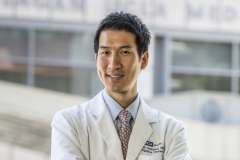
Director of Clinical Research, UCLA Center for Inflammatory Bowel Diseases
Health Sciences Clinical Professor of Medicine
Vatche and Tamar Manoukian Division of Digestive Diseases
David Geffen School of Medicine at UCLA
Dr. Limketkai received his medical degree from the University of Cincinnati, where he was inducted into the Alpha Omega Alpha honor society. He subsequently completed his internal medicine residency, gastroenterology fellowship, and PhD education at Johns Hopkins University. Given his clinical and research interests in inflammatory bowel diseases (IBD) and nutrition, Dr. Limketkai pursued advanced training as the Theodore M. Bayless Fellow in Inflammatory Bowel Diseases at Johns Hopkins University and clinical nutrition training through the Nestlé Nutrition Institute. He is currently board certified in gastroenterology, clinical informatics, and as a physician nutrition specialist.
Prior to joining UCLA, Dr. Limketkai served on the clinical faculty at Stanford University and as IBD physician leads at the VA Palo Alto. He spearheaded the Gastrointestinal Nutrition Program and launched the Fecal Microbiota Transplantation (FMT) Program at Stanford.
At UCLA, Dr. Limketkai and colleagues are working to further the Center for Inflammatory Bowel Diseases' outstanding patient care, high impact research and education. Their philosophy of care centers around the uniqueness of each IBD patient, addressing their multi-disciplinary and personalized needs.
As director of IBD clinical research, Dr. Limketkai strongly believes in harnessing the synergy between clinical care and research. He is keenly interested in studying the relationship between [mal]nutrition and IBD, identifying novel treatment approaches for IBD, developing evidence-based frameworks for precision nutrition, and applying technology (e.g., digital health, artificial intelligence) for nutrition and gastroenterology.
Dr. Limketkai's other research arm involves large data analyses of clinical outcomes and health services utilization. The primary goal of this endeavor is to better understand the factors that drive favorable or unfavorable outcomes in IBD. Through our multi-institution collaborations, he hopes to generate data that will help shape and improve the future care of IBD patients. Limketkai Lab
Cathy Liu - Digestive Diseases

Programmer/Analyst
G. Oppenheimer Center for Neurobiology of Stress and Resilience
Vatche and Tamar Manoukian Division of Digestive Diseases
David Geffen School of Medicine at UCLA
Cathy serves as the data manager for all clinical research data generated at the G. Oppenheimer Center for Neurobiology of Stress and Resilience. She is also part of the center’s Neuroimaging Core’s database team and manages the PAIN Repository database. G. Oppenheimer Center for Neurobiology of Stress and Resilience
Aldons J. "Jake" Lusis, PhD - Microbiology, Human Genetics & Medicine

Professor, Microbiology, Human Genetics and Medicine
David Geffen School of Medicine at UCLA
Dr. Lusis’ lab studies naturally occurring genetic variations in mice and in humans to help understand interactions underlying complex cardiovascular and metabolic disorders. A major focus of the lab has been integrate clinical traits with “intermediate" phenotypes obtained using high throughput technologies such as RNA sequencing, metabolomics, or proteomics, an approach known as "systems genetics" (Seldin et al. 2019 Nature Metab. 1:1038-1050). To facilitate this approach, they have developed a reference resource termed the Hybrid Mouse Diversity Panel (HMDP) that can be used to carry out whole-genome association mapping and analyze complex genetic interactions (Norheim et al. 2019 Cell Metab. 29; 1-18). Current research projects include atherosclerosis, heart failure, fatty liver disease and obesity. Lusis Lab